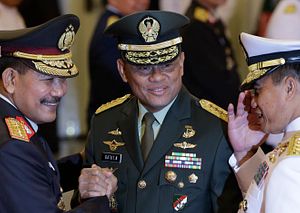After 19 years of reform, which was marked by the retreat of the Indonesian Military (TNI) from Indonesian daily political life, former TNI commander Gatot Nurmantyo has publicly displayed his political aspirations. Nurmatyo’s political ambition can be seen as a reflection of how Indonesian political institutions have been weakened in their management of the legacy of military-backed authoritarianism under Suharto’s New Order. As a result, the TNI has been grappling with how the institution constrains the political ambitions of its high-ranking officers, to what degree the military can respond to the growing concern of conservative religious identity, and the extent to which the military can achieve its defense policy to improve its force as a modern and professional military.
Nurmantyo’s ambition to be active in political matters is not unique in Indonesia’s period of democratic consolidation. In their waning days of serving the country as military officers, some high-ranking officers prefer to meddle in civilian politics instead of remaining neutral. This raises the question of how the TNI controls these political aspirations. Internal military reform, which was embarked on in 2002, could not generate strong institutional constraints over the political aspirations of senior military officers. Rather, the 2002 TNI Law merely provides normative guidelines to constrain the political aspirations of individual officers who want to compete in elections, by requiring those officers to be neutral and resign from their military positions. However, this law does not specifically address potential abuse of power by using military positions and facilities for political gains, particularly to boost an officer’s profile prior to the election.
Since the end of the New Order, the TNI has redefined its role in Indonesian democracy. Politics in Indonesia is dominated by identity politics, including Islamic parties, which boast a strong mobilization capability that has developed during the past three years. In contrast to the early reform period, in which the military used Muslim groups to underpin its elements of previous dominance, such as bringing order, Indonesia’s consolidated democracy provides an arena for both conservative Islamic groups and the military to express their complementary interests. For the Islamic conservative groups, TNI support boosts their bargaining power toward those they consider an “enemy of Islam,” including the current administration. Likewise, the military presumably manipulates Islamic voices to underpin its role outside of its defense-related duties. As a result, civilian influence on defense oversight, regarding its primary functions, remains weak. Both Islamic conservative groups and the TNI have received larger public attention due partly to their understanding of how to exploit one political weakness of President Jokowi: the lack of a stronghold in either the Islamic grassroots or the military.
In addition, Nurmantyo, during his reign as a TNI commander, did little regarding Jokowi’s ambitious Global Maritime Fulcrum, and how the military will adjust to this plan is still unclear. As the TNI has set up its defense policy under Minimum Essential Force (MEF) 2024 in order to improve its capabilities in addressing current and future threats to Indonesian territorial integrity, Nurmantyo has displayed limited interest in deeply charting the extent to which TNI can achieve the ambition of Indonesia’s being a regional power.
Nurmantyo’s time as a former TNI commander (2015-2017) should elicit concern about how the Indonesian government deals with the legacy of the authoritarian regime, particularly in regard to controlling the political aspirations of officers. Managing these ambitions will have a profound effect not only on the democratic system but also on military modernization. The key issue is not the potential of TNI’s re-establishing its role in daily political life, but rather how the civilian government can build strong civilian control, particularly among those senior officers who still display high political aspirations and engage in non-military activities.
Hipolitus Yolisandry Ringgi Wangge is a researcher at the Marthinus Academy Jakarta.
































